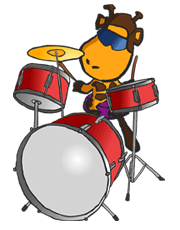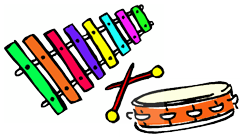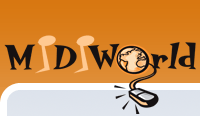 |
 |
Digital Keyboard & Theory
Station
Classical Piano
Pop / Jazz Piano
Guitar Courses
Classical Violin |
Flute Fantasy
Drummers’ Beat
Art Expressions
Music Appreciation
MIDIKids’ Composing Station |
| IT Music Keyboard & Theory Holiday Program |
| |
 |
| • |
This is the course all kids look forward to – loads of musical fun! |
| • |
The Digital Keyboard & Theory course introduces beginning students to keyboard performance and note reading in a holistic program, including the organized development
of pitch, rhythm, note singing, keyboard and movement activities. Students get to learn basic piano playing skills (keyboard) and music theory in a fun and interactive way. |
| • |
This course is an IT music course for young children interested in getting a head-start in a music education. This course has a similar music syllabus to a traditional
music education using an upright piano. |
| • |
On top of that, 'DKT' has an added advantage - learning music through the computer. The method of teaching theory verbally may bore many children off today, thus 'DKT'
introduces a fun and highly effective way of teaching children music theory through music games. |
| • |
If your child is constantly restless when learning things or gets bored easily, this is the perfect course! They will play musical games on the computer, be intrigued with
the fun characters in the games while they keep their musical interest locked in tightly. |
| • |
As 'DKT' has exactly the same music syllabus as the 'Classical Piano', students
can switch over to the graded 'Classical Piano' anytime. Students will achieve basic note-reading
skills & rhythm sense; ability to play simple songs independently, hands separately, then together; overall music appreciation
& basic computer skills. |
| • |
Using a touch-sensitive keyboard, even a 2 yr old is able to strike the key well! This touch will slowly be adjusted to the hard touch of a normal piano, as the student
progresses. |
| |
|
| |
Other skills learnt:
Note-reading
Rhythmic patterns
Keyboard techniques
Ear training
Voice training
Knowledge of musical expressions and tones
Music arrangement and improvisation
Music appreciation and interest |
| |
|
| |
"A highly recommended start for a young child's piano education!"
- MIDIWorld's Teachers |
|

|
 |
| • |
This course is exam-focused, suitable for students heading towards an exam-oriented music education. |
| • |
Students will learn note-reading skills, rhythmic patterns & beats, hand coordination skills and piano playing techniques. |
| • |
The repertoire of songs learnt in this course are mainly classical-based. |
| • |
Students will be prepared for all the components necessary for the ABRSM exam standards once the student is ready to take music exams, with the discretion of the piano teacher. |
| • |
Students can also be upgraded anytime when ready, or with the music teacher's recommendation. |
| |
|
| |
"For the young and old who truly have a passion for learning the piano"
- MIDIWorld's Piano teachers
"An exam-oriented course that will be certified and recognized internationally"
- MIDIWorld's Piano Teachers |
|

|
 |
| • |
Improvising at the keyboard will be broken down into basic harmonic, melodic and rhythmic concepts. Students will be introduced to using pentatonic scales, blues improvisation and Latin
styles. Bass line construction will also be covered as it applies to different styles. |
| • |
This course is non-exam based, catered for creative individuals who are interested in learning music for leisure. |
| • |
It emphasizes on pop and jazz music syllabus, chord progression styles, jazz beats & improvisation techniques. |
| • |
Students in this course will be able to sing and play chord accompaniments for individual relaxation, or together with other instruments to form a band. |
| • |
Suitable for children and adults of all ages. |
| |
|
| |
"A lifelong skill that will be enjoyed by all ages for life!"
- MIDIWorld's Pop Piano Teachers |
|

|
 |
Types of Courses:
Classical Guitar Course
Pop / Jazz Guitar Course |
 |
|
Types of Guitars:
Acoustic Guitar (Classical / Folk)
Electric Guitar (Electric Lead, Electric Bass) |
|
The Classical Guitar course follows the Trinity College of Music examincation standards, while the Pop/Jazz Guitar courses are non exam-oriented, suitable for students who prefer learning guitar for leisure or relaxation. |
| • |
These two courses are non exam-oriented, suitable for students who prefer learning guitar for leisure or relaxation. |
| • |
The guitar course emphasizes on chord strumming, chord progression techniques, finger plucking and accompaniment techniques. |
| • |
The essentials of music theory will be taught for each level. |
| • |
Students will learn note-reading skills, rhythmic patterns & beats and relevant instrumental playing techniques. |
| • |
The repertoire of songs learnt in this course varies from classical to folk and pop songs. |
| • |
Students will be able to perform sing-along sessions with a group of friends, or form their own band. |
| • |
Students will be upgraded to the next level after they have met all criteria from each level, or with the music teacher's recommendation. |
| |
Electric Guitar (Electric Lead, Electric Bass)
- Beginner
- Intermediate
- Advanced
This course is non exam-oriented, a very popular course with teenagers and adults who love jazz, rock and alternative music.
These students will be trained to play their favourite band songs, as our teacher,
a professional performer transcribes the melody into chords and notes for
easy playing.
We also hold casual concerts twice yearly for these students to perform as a band, together with the keyboardist and drummer. There will be rehearsal practices where these students get their ample jamming practice sessions. |
| |
"A classic instrumental course for the young and old."
- MIDIWorld Guitar Teachers |
|

|
 |
"Classical music is the spiritual factor which brings people together and unites
them, irrespective of religion and culture, appealing to sublime senses."
Emphasis will be given to the individual needs of each participant. Intensive
study gives students the opportunity to prepare for exams, competitions,
and improvement.
Students
will have an opportunity to perform solo in MIDIWorld's bi-annual
Casual Concerts. |
|
|

|
 |
"The flute is a ceaseless journey of discovery: discovering new music, new people, and rediscovering yourself." - Matthias
Ebner
"Playing the flute is not just my job. I consider it to be a joy, but also a challenge and a passion."- Dominique Thomet |
| The Flute Fantasy is aimed to help develop students' understanding of and ability
to perform the technical fundamentals associated to flute playing. It also develops students' expressive potential as it teaches the art of communication
through music. |
| • |
The flute course teaches technical fundamentals of flute playing: body and hand position, breathing, fingering, articulation etc. |
| • |
Expressive nuances of flute playing: phrasing, stylistic interpretation, etc. |
| • |
Theory of music appropriate to each student's standard: note reading, rhythm and beat, musical symbols etc. |
|

|
 |
 |
- Beginner
- Intermediate
-
Advanced |
| Course Outline: |
•
•
•
•
•
•
•
•
• |
Posture and grip
Co-ordination and independence
Groove and feel
Drum score reading
Rudiments
Dynamics
Play-alongs with music
Style studies (Rock, Pop, Jazz, Latin)
Practice sessions with our electric guiar and keyboard students |
Once you learn the basic teachnics, you will start to play the drums along with recordings from different styles of music so you can relate your drumming to a musical example.
Drumming is Life
It teaches us self-esteem, self-motivation, coordination, focus, confidence and commitment. Most of all it teaches us how to have FUN!
Drumming is Art
It allows us to take all accumulated knowledge and skill and use it to create emotion.
Drumming is Math
It is all about consecutive subdivisions of time organised into rhythms which must be calculated instantaneously.
Drumming is Physical Education
It requires extraordinary coordination of fingers, hands, arms, ankles, and
legs, as well as real control of the back, chest, arms, and leg muscles |
|

|
 |
"Promoting higher thinking skills, problem solving and discovery learning’" |
| • |
Craft-work, creative and fine arts instruction for children |
| • |
Individual attention with our small class ratio |
| • |
Easily incorporated with other academic disciplines |
| • |
Excellent resource for after-school creative opportunities |
| • |
Promotes personal achievement in students which helps build self-confidence |
| |
| |
Sample Lesson Contents:
Using shapes to spark imagination
Creating Paper Mask
Clay modeling
Printmaking-exploring patterns
Paper mache
Craft work
Making a collage
Basic color theory
Photo montage
Watercolor paintings
Texture rubbing |
 |
| |
| Why should children learn Art? |
| • |
To emphasize how art impacts our daily life, including clothing, buildings, home interiors, cars, product packaging and advertising |
| • |
To improve critical thinking skills and creative problem solving |
| • |
To enable children to read visual information and communicate using
visual media |
| • |
To teach children multiple perspectives |
| • |
Art will help children learn to say what cannot be said, by expressing out their feelings, moods and thoughts through drawings |
| • |
The Arts enable children to have experiences that lead them to discover the range and variety of what they are capable of feeling |
|

|
 |
| • |
MIDIWorld’s Music Appreciation courses are specially planned to satisfy the curious minds the young child. This is the stage where a child’s brain starts to develop fast. |
| • |
The 3 levels of music appreciation will give your child an insight into the world of music, paving the way towards their first interaction with the fine natures of music, as they play, learn and explore individual creativity and imagination. |
| • |
This course aims to develop a child’s musical senses, creating a keen interest in basic music appreciation. |
| • |
They will be exposed to musical rhythms and beats, creating a foundation for instrumental playing. This will be a stepping-stone towards a wonderful life-long music education. |
| |
| Course Outline: |
 |
•
•
•
•
•
•
•
• |
Singing & clapping
Rhythm & beats
Tempo & dynamics
Musical symbols & terms
Melodic patterns identification
Percussion instruments
Music & drama
Teamwork |
|

|
 |
| • |
MIDIkids’ Composing Station is a music composition programme where students are taught how to compose songs on their own. |
| • |
This programme allows students to let their creative juices flow by composing their very own songs. Students will demonstrate their flair for music by combining their imaginative, artistic and musical ability. |
| • |
They will get to create full band and orchestral arrangements, harmonising their own accompaniments. |
| • |
This is a fully computerised music course, where students compose and notate on music notation software. |
| • |
IDIkids’ Composing Station is suitable for inspiring young musicians who want to take music one-step further, other than instrumental playing |
| |
|
| Course Outline: |
•
•
•
•
|
Efficiency in Finale / Sibelius music composing software
Chord Arrangement, improvisation & Harmony
Enhanced music creativity
Theory of Music composing knowledge |
|

|
 |
Suitable Age Group: 5 - 11 yrs (Beginner)
Class Size: 6 - 8
Course Fee: S$195.00
Materials Fee: S$5.00
Course Duration: 1 month
Total Number of Lessons: 8
Duration Per Lesson: I hour 10 minutes |
| Musical Knowledge Taught: |
•
•
•
•
•
•
•
• |
Basic Keyboard Skills
Musical Notes & Alphabets
Rhythmic Sense
Listening Skills
Music Games
Music Appreciation
Introduction to Various Instruments
Music Making with Percussion Instruments |
| View Lesson Plans |
|

|
| |
| Home > Our Courses |
|
|



















